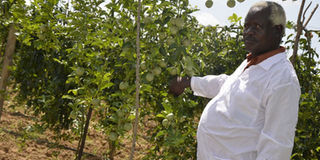Passion fruit farming has seen my income triple

PHOTO | LILLIAN OCHIENG' Mr Clement Odongo tends to his passion fruit farm at Kodungo village, Siaya County. He has planted 425 passion fruit vines.
What you need to know:
- After visiting a passion fruit farm in Uasin Gishu County, former ink maker vows to start planting the crop at his farm in Siaya
A farmer in Siaya County has broken the norm to start growing passion fruit. Farmers in the region have predominantly planted maize as the main crop. Mr Clement Odongo has seen his income triple compared to the time he used to plant maize.
“I adopted farming tactics from Lessos, Rift Valley. After my retirement, I visited the area in 2011 and admired what passion fruit farmers in the region were doing. I vowed to borrow the idea,” said the retired ink maker.
Mr Odongo cannot hide his joy as he surveys his four-acre farm that has 425 vines, all promising to give good returns.
“This earns me my daily bread. I harvest the fruits every week. About 275 vines fetch me at least Sh30,000 a week,” he said.
Out of the 425 vines on his farm, about 150 were planted recently and are yet to mature.
“I started with 150 vines only and increase them every year,” he revealed. Mr Odongo encourages other farmers in the county to join the business as passion fruit farming does not entail a lot of work save for weeding, pruning, and harvesting.
Once one starts harvesting, he says, each vine produces at least two kilogrammes of fruits every week. A kilogramme fetches between Sh100 and Sh120. Compared to maize, he says, passion fruit farming is better because it earns good money and also requires less labour.
“An acre of maize produces 20 to 30 bags of grain while an acre of 670 vines gives two kilogrammes of passion fruits each vine on a weekly basis,” he says.
Mr Odongo has joined hands with other passion fruit farmers in the area in the Siaya Passion Growers Association. Through the group, he has benefited from several tours to other farming regions in Kenya to gain more skills. A Dutch firm, Simon Navy Veronica (SNV), and Millennium Management Consultant (MMC) have also been helpful in boosting his skills.
The group has more than 150 members who plant the fruits on large-scale spreads all over the county.
The 65-year-old farmer says he has never regretted his decision two years down the line as the business has brought him greater fortune than he expected.
The harvesting of the fruits starts six months after planting and goes on every week for five years with two-week intervals in between for pruning.
“Once a tendril has been fully exhausted, we prune it and give it two weeks to produce more fruits, otherwise the tendrils will just grow without fruits,” he explains.
The pruned tendrils decompose into manure that is used to improve the productivity of the land. The fruits can be harvested at three stages — the almost-ripe, the ripe, and the falling. During harvesting, the farmer picks the falling and the ripe, leaving the almost-ripe fruits for the next harvesting during which they will either have fallen or become ripe.
Mr Odongo has harvested over 1.9 tonnes of the fruits from the 150 stems that he started with. All his expenses, including land preparation, inputs, seedlings, and labour, are slightly over Sh60,000.
The father-of-five said he employs five casual labourers to help him prepare the land, plant, weed, and spray the vines to prevent diseases. His children are adults and have moved to the city for formal jobs since “they do not want to get themselves dirty in the shamba”.
Apart from the free training, Mr Odongo has also got help from USAID. The organisation visited his farm, bringing him a wheelbarrow, a foot pump, and pipes to sprinkle water on the farm during the dry season.
Another firm, Green Zone Agencies, has also prepared for him a water pond that supplies his crop with a reliable source of water.
Kisumu and Busia provide the passion fruit farmers with a ready market. “The hot sun ripens the fruits to a sweeter taste than those from cold regions,” Mr Odongo says. They have received orders from abroad but have not honoured them due to low production volumes.




